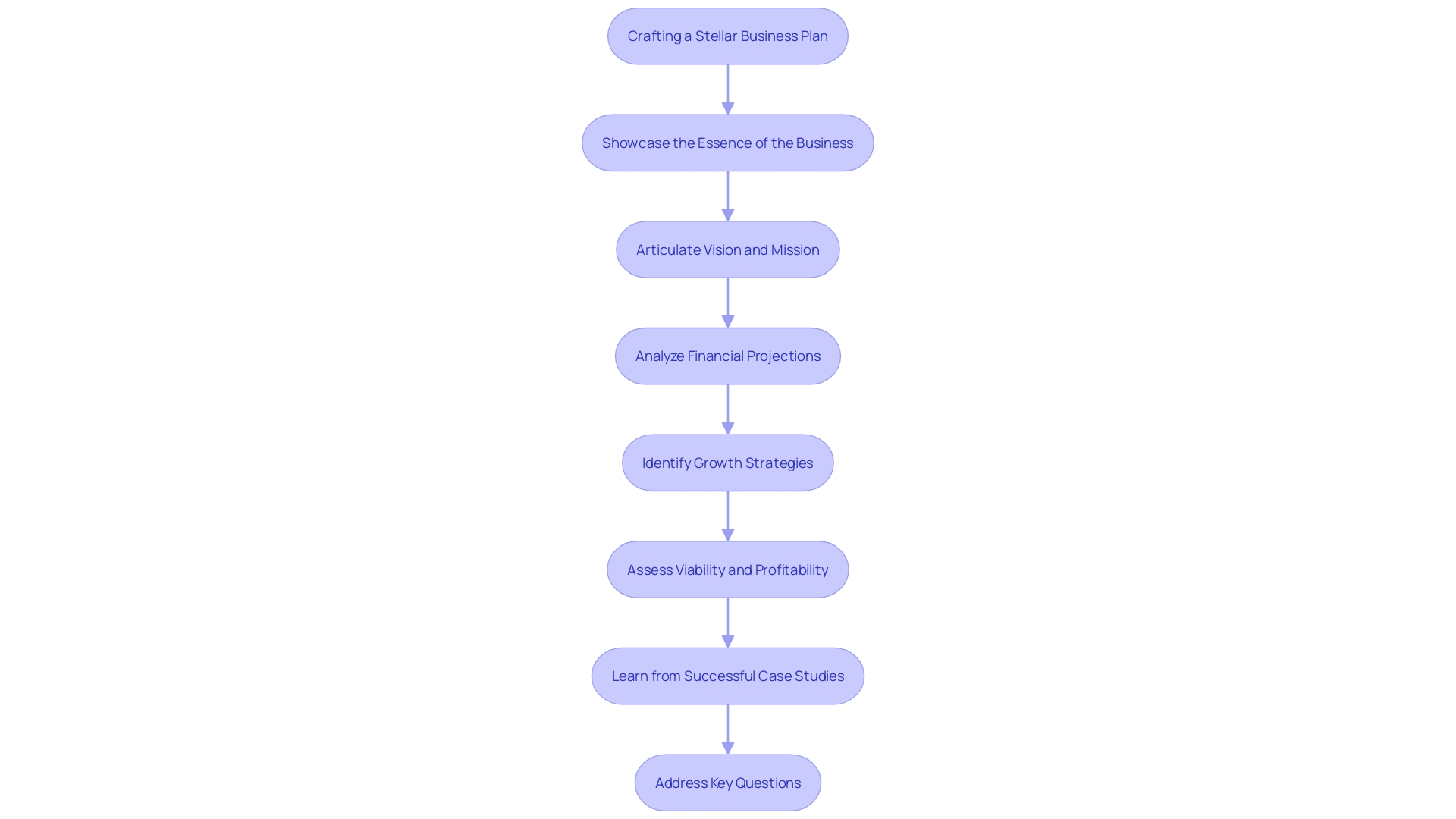Introduction
Navigating the complexities of the business marketplace requires careful attention to detail and strategic foresight. Whether you're considering selling your venture or exploring an acquisition, understanding the business sale process is essential. A crucial element of this process is conducting a comprehensive valuation, which ensures that you don't settle for less than your business's worth and attract potential buyers with realistic figures.
In addition to financial analysis, a thorough valuation considers factors such as assets, customer base, and market trends to guide negotiations. With the right knowledge and insights, you can make informed decisions that set your business up for success in the future. Join us as we delve into the intricacies of valuing a business and explore the importance of thorough market research and preparing a comprehensive business plan.
Understanding the Business Sale Process
Navigating the intricacies of the business marketplace, whether you're contemplating selling your venture or considering an acquisition, is a journey that demands acute attention to detail and strategic foresight. Sellers yearn for a return on their years of investment, while buyers scour the landscape for a venture that promises growth and fits their vision. Among the critical elements of this transaction is the valuation, a step often mishandled to the detriment of the business owner.
A comprehensive valuation, as emphasized by industry experts, ensures that one doesn't settle for less than the business's worth or frighten off potential buyers with inflated figures.
An accurate valuation encompasses an analysis of financial statements, assets, customer base, and market trends, offering a clear picture that guides negotiations. This process is crucial, as highlighted by Frank Williamson, CEO of Oaklyn Consulting, who notes that the uniqueness of a business's offerings and its market position can significantly influence its appeal to buyers and the success of a sale. Similarly, Stephanie Wells of Formidable Forms underscores the importance of projecting where your company will stand in the next decade to make an informed decision about a sale offer.
Cases like the Akiya property acquisition in Japan demonstrate the necessity of understanding every facet of a transaction, from initial costs to the full scope of the project.
In this intricate dance of commerce, one must tread carefully, armed with knowledge and expert insights, to emerge from the transaction with a sense of fulfillment and assurance that the right decisions were made for the future of the business.

Conducting Thorough Market Research
Delving into the realm of business acquisitions or disposals necessitates more than a cursory glance at the market; it demands in-depth market research that delves into industry trends, consumer demand, and the competitive landscape. Harnessing primary research techniques, such as surveys, allows you to gather fresh insights directly from the market, unveiling perceptions, attitudes, and behaviors that can shape your strategy. For instance, knowing the most common terms found in Cloud Service Agreements or understanding how negotiation styles vary with company size, as highlighted in a report built from over 1,000 contracts on the Common Paper platform, can be crucial.
Engaging the expertise of valuation professionals can spare you from the pitfalls of guessing your business's worth, ensuring that you don't undersell or scare away prospects with inflated expectations. They meticulously assess your financial, assets, and industry dynamics to pinpoint your enterprise's fair market value, which becomes your indispensable compass during negotiations. Entrepreneurs, like Stephanie Wells of Formidable Forms, emphasize assessing the future trajectory of your business as a key decision factor when contemplating a sale.
Furthermore, real-world cases, such as the intricate process of an Akiya property purchase in Japan, underscore the need to understand every detail of the transaction you're entering into. This can save both time and money, as seen with the American client seeking a serene beachside property, who engaged professionals to streamline their search.
Lastly, staying abreast of current events, like the SBA's initiatives to aid women-owned small businesses in securing federal contracts, or Google's Bard update enhancing multilingual capabilities, can provide additional perspectives on the evolving market conditions that influence business buying and selling.
Valuing the Business Properly
Valuing a business is a nuanced process, blending art and science to arrive at a fair market value. One of the most innovative approaches to this challenge emerged in the 1990s with the Berkus Method, a scorecard valuation method created by investor Dave Berkus to address the difficulty of valuing pre-revenue startups during a time of burgeoning technology firms. This method assigns a general value to key elements of a young business, providing a more qualitative assessment of its potential.
Understanding the difference between pre-money and post-money valuations is paramount as well. The former refers to a company's worth before investment, while the latter includes the new funding. These concepts are critical when it comes to the impact of investment on ownership equity and share distribution.
Startup valuation, particularly, is a challenging endeavor due to the lack of historical data, uncertain future projections, and an absence of comparable market entities. It's a sector where intrinsic value often trumps traditional financial metrics, a sentiment echoed by Marc Andreessen in his influential essay, "Why Software Is Eating the World." Andreessen noted the importance of looking beyond financial valuation to the intrinsic worth of Silicon Valley's rising companies.
The art of valuation also involves considering qualitative factors like market position and growth opportunities, alongside quantitative ones like financial metrics. This holistic approach was underlined by one expert's advice to involve valuation professionals familiar with industry transactions to leverage their insights for a more accurate valuation.
The advent of big data and predictive technologies like AI and machine learning has added another layer to the valuation process, as these tools are used to forecast outcomes such as demand or customer behavior. This predictive power is what sets data apart as an asset in today's economy, emphasizing the evolving nature of business valuation in the digital age.
Preparing a Comprehensive Business Plan
Crafting a stellar business plan is essential for both sellers and buyers in the realm of business acquisitions. For sellers, this document is your chance to showcase the essence of your business, including the unique selling points that set it apart from the competition. It should clearly articulate the business's vision and mission, as well as offer a detailed look at financial projections and growth strategies.
Capitalizing on the growth potential and competitive advantage of your business within this plan can be pivotal in attracting serious buyers and investors.
From the buyer's perspective, a robust business plan is a tool for assessing the viability and profitability of a potential purchase. It allows buyers to critically analyze the business model and forecast its future success. As seen in the case of an American client's acquisition of an Akiya property in Chiba, Japan, understanding every aspect of the purchase, including costs and project scope, was crucial in making an informed decision.
By learning from successful case studies, such as the strategic SEO and content creation approach taken for a client's digital platform, one can see the importance of meticulous planning and execution. Integrating insights from direct competitors and optimizing for search engine visibility are also practices that can be applied to the business planning process.
Moreover, a recent Fiserv report has highlighted the resilience of small businesses, reflecting a strong demand for consumer products and services. This positive outlook indicates that a well-conceived business plan could be a key factor in driving success in today's market.
In creating your business plan, ask the right questions: What are the organization's goals? What steps are necessary to achieve them? What is the difference between this plan and a strategic plan?
Addressing these queries will help ensure that your business plan doesn't merely outline what your business is but also defines where it's headed and how it will get there.

Conclusion
In conclusion, navigating the business marketplace requires attention to detail and strategic foresight. Conducting a comprehensive valuation is crucial, ensuring you don't settle for less than your business's worth and attract potential buyers with realistic figures. Thorough market research and engaging valuation professionals help avoid pitfalls and provide insights into evolving market conditions.
Valuing a business involves a nuanced blend of art and science. Understanding pre-money and post-money valuations is vital in assessing investment impact. Qualitative and quantitative factors shape the valuation process, with big data and predictive technologies adding a new dimension.
Crafting a stellar business plan is essential for sellers and buyers. It showcases unique selling points, attracting serious buyers and investors. Learning from successful case studies and competitor insights strengthens the planning process.
In summary, by conducting a comprehensive valuation, performing thorough market research, valuing the business properly, and preparing a robust business plan, you can make informed decisions for future success. With knowledge, expertise, and meticulous planning, you can navigate the business sale process successfully.




